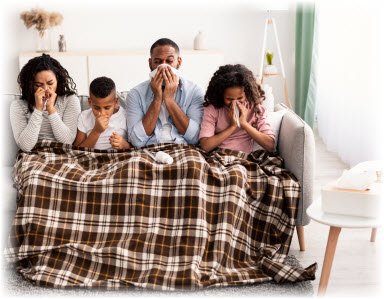Staying Healthy Throughout Respiratory Disease Season

Each year in the United States, respiratory viruses such as influenza (flu), COVID-19, and respiratory syncytial virus (RSV) circulate during the fall and winter season. These viruses cause illnesses of varying severity, including hundreds of thousands of hospitalizations and thousands of deaths. Fortunately, we now have updated immunizations, effective treatments, and tests to help protect ourselves, our families, and our communities throughout the respiratory disease season.
The number one doctor recommendation for protecting yourself and your loved ones from respiratory disease season is to get vaccinated. Vaccines remain one of the major defenses we have to fight against flu, COVID-19, and RSV. Now is the best time to make an appointment with your doctor or a pharmacy to get updated vaccines for the whole family so you are prepared for the season ahead.
This year, updated immunizations are available for all three of the major fall and winter respiratory diseases. September and October remain the best times for most people to get vaccinated. Below are immunization recommendations from the Centers of Disease Control and Prevention (CDC):
COVID-19 and Influenza
- Everyone 6 months of age and older should receive the COVID-19 vaccine and the annual influenza vaccine.
- Getting these vaccines in September or October is ideal. If you miss that timeframe, it’s not too late to get a shot after that, since respiratory disease season usually sticks around until May.
RSV
- Everyone 75 years of age and older should receive RSV vaccination if they haven't been previously vaccinated.
- Adults 60 through 74 years of age with certain medical conditions that increase their risk for severe RSV disease, such as lung or heart disease, should receive RSV vaccination if they haven't been previously vaccinated.
- All young infants should be protected against severe RSV disease through one of the following:
- Vaccination of those who are pregnant 32 through 36 weeks of gestation from September through January
- Immunization of infants less than 8 months born during or who are entering their first RSV season with a monoclonal antibody that prevents against RSV
Here are some other ways you can protect yourself and others around you from flu, COVID-19, and RSV this season:
- Wash hands frequently. Wash your hands with soap and water or use hand sanitizer with at least 60% alcohol if soap and water isn’t available.
- Cover your cough and sneeze. Use a tissue or the inside of your elbow to cover your mouth and nose when you cough and sneeze.
- Improve airflow. Increasing airflow and cleaning the air in your home and work spaces can help to lower risk for respiratory viruses. Opening doors and windows to let some fresh air in and changing filters in your air conditioning systems and air purifiers can help to lower risk of virus transmission.
- Other everyday actions. Cleaning and disinfecting, masking, and staying home when you are sick can provide an additional layer of protection from respiratory diseases.
Visit PIHHealth.org/Doctors to find a doctor near you. Make an appointment for your vaccines at a PIH Health pharmacy today. Visit PIHHealth.org/Pharmacy for locations and hours.